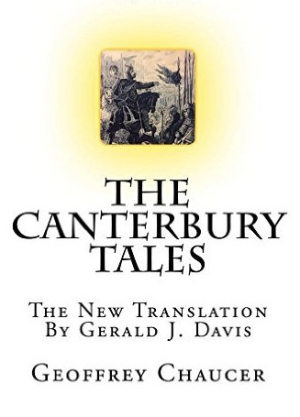The Canterbury Tales
The New Translation
Chaucer’s classic stories are given new life in this accessible translation.
Just like the hems of skirts that rise and fall with the current fad, many books are loved in their time before quietly being put to rest on dusty shelves. There are a few that manage to hang on, outliving their authors and remaining relevant to following generations. Geoffrey Chaucer’s Canterbury Tales is one of these long-living books that has embedded itself into literary critique, English 101 reading lists, cultural consciousness, and the history of the English language. Gerald J. Davis’s new translation offers readers an accessible entrée into this early English literature.
Set in Chaucer’s England of the late fourteenth century, a group of pilgrims is preparing to set out to Canterbury. Drawn from a wide variety of sections of caste and character, the pilgrims are united only in their religious trek. At the inn where their journey starts, the travelers’ host offers a challenge to make the time pass more easily: the pilgrim who is able to tell the most engaging and enjoyable story will have a free dinner upon their return. The result is a collection of tales drawing from folklore, classical Greco-Roman tales, biblical texts, and the storytellers’ own lives.
Davis is no novice at translating classics into modern English, having previously published translations of Gilgamesh, Beowulf, and Don Quixote, alongside his own work in fiction. This experience shows as he tries to walk the tightrope described in his introduction of “render[ing] the voice and tone of Chaucer in a form of prose accessible to the modern reader.” Though much of the translation succeeds in this balancing act, there are times when some may wish for a footnote or two for certain references from sources like Plutarch.
Those expecting a wholesome collection of stories from pious pilgrims may be surprised by the bawdiness of the text. Chaucer’s characterizations aren’t Christian allegories for good virtue, but are of everyday people who contain the high and base qualities of human nature. Humor, including fondness for jokes of cuckoldry, humanizes the text, and highlights why The Canterbury Tales is such an enduring book.
This paperback edition is simply packaged, with a minimalist layout that focuses the attention on the translation. The page margins are narrow, though, and there are times when text runs too close to the page’s inner edge.
This is a reliable option for those looking to join the walk down the road to Canterbury. Davis’s translation highlights the relaxing flow of Chaucer’s stories, which are still funny and poignant centuries after they were first put to paper.
Reviewed by
Constance Augusta A. Zaber
Disclosure: This article is not an endorsement, but a review. The publisher of this book provided free copies of the book and paid a small fee to have their book reviewed by a professional reviewer. Foreword Reviews and Clarion Reviews make no guarantee that the publisher will receive a positive review. Foreword Magazine, Inc. is disclosing this in accordance with the Federal Trade Commission’s 16 CFR, Part 255.


